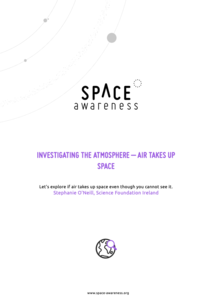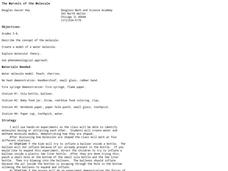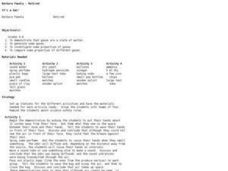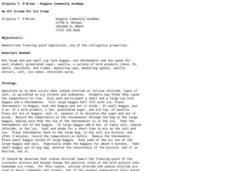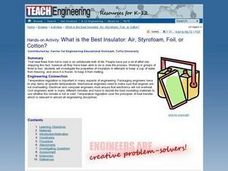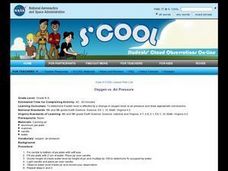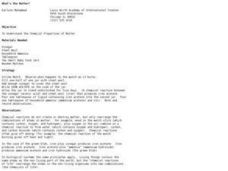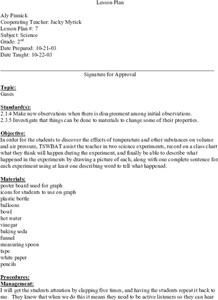Curated OER
Air Is there
Learners experiment to observe air and its mass. In this air lesson, students use the scientific method to complete experiments that demonstrate the properties of air. Learners view a video as follow-up.
Curated OER
Air Pressure
Learners participate in a series of demonstrations about Bernoulli's principle. They explain how air pressure varies with air speed. They write a detailed lab report about the activity. This is a great way to explore this concept.
Curated OER
Properties of Air
Fourth graders participate in a demonstration lesson using bubbles in which they determine that air fills the bubbles. Next, they work in small groups as they they experiment with the properties of air at separate work stations. After...
Space Awareness
Investigating the Atmosphere - Air Takes Up Space
How do you know there is air? Can you see it, smell it, feel it? To begin the investigation, learners watch a video and discuss what they know about air and the atmosphere. Then, they participate in five different hands-on, inquiry-based...
Curated OER
The Marvels of the Molecule
Students experiment with common substances to observe molecular behavior. In this molecular properties lesson, students move through four stations as they try to inflate a balloon inside a bottle, pour water from a jar, and observe how...
Curated OER
Air Is All Around Us!
Students design an instrument to show that air is all around. In this air lesson plan, students research, construct, and present a design that proves that air is all around, even though they can't see it or touch it. A teacher and self...
Curated OER
Non-Compressibility of Water
Students will observe a property of water. For this inquiry-based properties of air lesson, students observe how a change in water pressure impacts the positioning of an eye-dropper in the water container and they make hypotheses about...
Curated OER
Which Brand of Air Freshener is Most Cost Effective?
Students use scientific method to determine cost-effectiveness of air freshener, and create PowerPoint presentations to share their results.
Curated OER
Properties of Soil: Original Lesson Plan
This lesson is an investigation of soil properties, particularly texture, color and space for air and water. Student inspect soil samples found in their locale, perform several tests to determine different properties, and involves a ...
Alabama Learning Exchange
Air is All Around You
Pupils investigate the mysteries of air. In this science lesson, students participate in hands-on activities that require them to use the scientific inquiry model to study air.
Curated OER
Air is something
Students recognize that air has the properties of mass and volume. They predict, observe, and evaluate the effect of the air on various objects, using bubbles and bubble wands.
Curated OER
Seashore Explorers
There are three separate lessons within this resource that can be used together, or that can each stand alone. In the first, five simple activities allow junior scientists to examine the amazing properties of water. In the second, they...
Green Education Foundation
How Loud is Too Loud?
Ever wonder how loud a sound has to be to cause damage? Young scientists explore sound properties by researching decibel levels. They discuss how sound is perceived by our ears and our brains and why it can cause negative health effects...
Curated OER
It's a Gas!
Students investigate gases and their properties by completing 4 activities. In this gases lesson plan, students perform activities to show that gases take up space, they diffuse, and that odors and vibrations pass through gases. They...
Curated OER
Rain and Rainbows
Students explore the weather system by analyzing water properties. In this precipitation lesson, students review weather related vocabulary terms and discuss how rainbows are created by light hitting droplets at the right time. Students...
Curated OER
Trapping CO2
Students investigate climate change and how the properties of carbon dioxide and methane play a part. In this climate instructional activity students use a chemical reaction to trap CO2 and methane.
Curated OER
We All Scream for Ice Cream
Young scholars investigate the freezing point depression of water while making ice cream. In this colligative properties lesson plan, students make ice cream using ice, salt and water to freeze milk and sugar. They measure the...
Curated OER
The Urban Heat Island Effect - Lesson 2 (Grade 5)
Fifth graders use the scientific process to examine how when various surfaces are exposed to similar environmental conditions, surface temperatures may vary. They conduct an experiment to show the relationship between surface and...
Curated OER
What is the Best Insulator: Air, Styrofoam, Foil, or Cotton?
Students investigate the properties of insulators by attempting to keep a cup of water from freezing, and once it is frozen, to keep it from melting. They conduct the experiment, record and analyze the results, and answer discussion...
Curated OER
Oxygen vs. Air Pressure
Learners conduct an experiment to determine if water level is affected by a change in oxygen level or air pressure.
Curated OER
Is Air a Fluid?
Students discuss the physical properties of fluids and then demonstrate that air carbon dioxide and oxygen) is a fluid by creating currents.
Curated OER
What's the Matter? (Living and Non-Living Things)
Understand how chemical reactions recombine atoms to create the "chemicals of life". An experiment, showing the basic chemical reactions of an iron nail or a match, helps young children start their understanding of permanent changes.
Curated OER
How Can You Tell One Clear Gas From Another?
Fifth graders perform experiments to determine the identity of an unknown gas sample. In this chemistry lesson, 5th graders fill balloons with air, oxygen, hydrogen, and carbon dioxide. They use mass and reactivity to identify the gases.
Curated OER
Gases
Second graders work with gases to determine what the effects of temperature are on volume and air pressure by working with balloons. Also, they experiment with vinegar and baking soda. They predict the outcomes of these experiments, and...





